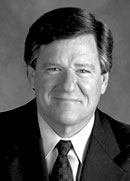Martin Nesbitt
 |
Age: 60
Residence: Asheville
Occupation: attorney
Education: B.A., UNC-Chapel Hill, 1970; J.D., UNC-Chapel Hill School of Law, 1973
Party: Democrat
Political experience: N.C. House 1970-94, 1996-2003; N.C. Senate 2004-present
1. What was the best piece of legislation the General Assembly passed last session? Why?
Funding for the mental-health-reform package.
2. What was the worst piece of legislation? Why?
Can’t recall.
3. What would be your three top legislative priorities?
• Water and issues such as the Civic Center
• Mental health: The Mental Health Oversight Commission will … help us identify service gaps. We intend to pursue funding those gaps in the next session
• Education: I will continue to work with local schools
4. Should our local legislative delegation have sponsored Sullivan Acts II and III in 2005? Why?
Yes. Due to infrequent legislative sessions and legislative rules, we could not take a wait-and-see attitude. It was necessary that we take action at that time on the information we had available. We could not risk citizens’ access to a necessity such as water.
5. What’s your stance on capital punishment?
I am convinced that absolute “life without parole” would be far superior to the system that we now have.
6. What most distinguishes you from your opponent?
My years of public service and my political philosophy. I firmly believe that the Legislature should be proactive in making a better life for our people.
7. What reforms are most needed in state politics?
Publicly funded elections.
8. What’s your position on the proposed passenger-rail service between Raleigh and Western North Carolina?
I am a strong supporter.
9. Would you support state funding for renovating or rebuilding the Asheville Civic Center? Why or why not?
State funding is probably not an option, as civic centers are usually built at the local level. However, I have committed to work with city and county leaders to provide legislation, if necessary, so that we can have a much-needed civic center in our region.
10. Name three state budget areas or items that should be reduced and three that should be increased.
Reduced: Each year we review all existing programs to find obsolete areas where money can be cut, and these cuts would be in the hundreds, not two or three
Increased: health and human services (mental health, AIDS funding and Medicaid). Also, education — public schools (K-12) and community colleges


